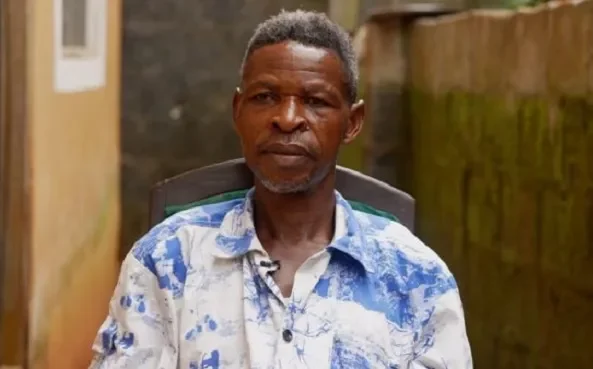Horror Reaction: Woman's Skin 'Falls Off' From Common Pain Meds

A mother-of-three, Aleshia Rogers, 27, from Nebraska, has shared her harrowing experience after she was put into a 21-day coma due to a rare and severe reaction to ibuprofen, causing her skin to 'fall off in sheets.' In August 2020, following the birth of her son Jaxon via c-section, she began taking two over-the-counter ibuprofen tablets daily. Despite having used ibuprofen, her 'go-to med,' for years to alleviate period cramps, her body reacted drastically.
After three weeks of taking the painkiller, Aleshia started exhibiting flu-like symptoms, including a fever and a burning sensation when swallowing. She also developed a rash on her chest and her eyes began to swell, becoming bloodshot and burning. Initially, upon visiting the ER, she was told she had pink eye and was sent home. The following day, her entire face was swollen, making breathing difficult, and her eyes were swollen shut. A second ER visit resulted in a misdiagnosis of scarlet fever, and she was again sent home, even advised to continue taking the painkiller.
Within hours, her symptoms rapidly escalated, leading to burning blisters across her face, eyes, and chest, causing her skin to peel off. Rushing to the hospital for the third time, she was finally diagnosed with Stevens-Johnson syndrome (SJS) and later, toxic epidermal necrolysis (TEN), both suspected to have been triggered by the ibuprofen. As her condition severely deteriorated, she developed sepsis and multiple organ failure, leading doctors to induce a coma that lasted three weeks.
During this critical period, Aleshia lost approximately 95 percent of her skin, which contributed to organ failure. Her family was informed she had only a 10 percent chance of surviving the ordeal. Stevens-Johnson syndrome is a rare and severe skin condition where the immune system overreacts to a trigger, in this case ibuprofen, and aggressively attacks healthy skin, the eyelids, and genitals.
SJS typically begins with flu-like symptoms such as a high temperature, sore throat, and joint pain, followed by a red or purple rash that usually starts on the upper body before spreading rapidly to the face, arms, legs, and other areas of the body. Blisters then appear on the skin, which burst to leave painful sores. Critically, the same internal damage occurs, primarily affecting the mucous membranes—the soft layers of tissue lining the digestive system, inside of the nose and mouth, and the genitals.
Five years on, Ms. Rogers is still recovering from long-term complications associated with SJS. Recalling waking from the coma, she learned her skin had 'died and detached,' a process referred to as 'sloughing,' where it 'fell off in sheets.' She also experienced significant memory loss, including forgetting the birth of her son. Her family confirmed that her survival was uncertain. Despite this, she tries to live without fear, viewing her survival as a miracle.
Ms. Rogers is now determined to raise greater awareness for this life-threatening condition, emphasizing that all drugs, including over-the-counter ones, carry risks. She explained that there is no prevention for the condition, and once it starts, there is nothing to stop it, with a continuous risk of recurrence. Doctors were unable to definitively explain why she suffered this severe reaction, as she had no prior adverse reactions to ibuprofen.
Without treatment, SJS can be life-threatening, with studies suggesting that approximately one in ten cases are fatal. Hospital treatment, often carried out in an intensive care unit, typically involves administering fluids to prevent dehydration, applying creams and dressings to moisturize the skin, and providing strong painkillers to ease discomfort and control inflammation. Some patients may also be placed into a medically induced coma to minimize further damage and stress on the body. For cases triggered by a specific medicine, patients must avoid that treatment for the remainder of their lives.
Beyond ibuprofen, other prescription drugs like modafinil or armodafinil, used to treat narcolepsy, have also been linked to triggering these agonising skin conditions. For instance, in the last year, nine individuals in Singapore were rushed to hospital after taking 'energy boosting' pills containing these substances, leading to diagnoses of SJS or its more severe form, toxic epidermal necrolysis. This highlights the severe risks associated with various medications, both prescription and over-the-counter.
You may also like...
Sesko Delivers! Man Utd Secures Vital Win, Easing Amorim's Hot Seat Pressure

Ruben Amorim's Manchester United secured a crucial 2-0 victory over Sunderland at Old Trafford, marking Amorim's 50th ga...
Scorsese's Sinner Past: Film Legend Reveals He Was Kicked Out of Priesthood for Bad Behavior

A new docuseries, “Mr. Scorsese,” reveals that legendary director Martin Scorsese, renowned for his cinematic exploratio...
Daddy's Watching: Trump Threatens SNL with FCC Attack Over 'Mean' Cold Open

"Saturday Night Live" launched its 51st season with a satirical cold open. Colin Jost portrayed a "secretary of war" lam...
Taylor Swift Shakes Things Up With New Acoustic Bonus Tracks on 'Life of a Showgirl' CD Variants!

Taylor Swift surprised fans with four new CD variants of her latest album, "The Life of a Showgirl," each featuring two ...
Afrobeats Dominates: Rema Hailed as International Success by Angelique Kidjo

Rema's ascent symbolizes Afrobeats' rise to global prominence, as celebrated by Angelique Kidjo on the TIME100 Next list...
Mohbad Family Legal Battle Deepens: Father Demands Prosecution of Daughter-in-law

Joseph Aloba, father of the late singer Mohbad, is pressing the Lagos State government to prosecute his daughter-in-law ...
Double Trouble! Navigate Life with Two Under Two: Your Essential Survival Kit Revealed

Caring for two children under two presents unique challenges, but expert Sarah Campus offers practical tips and essentia...
Africa Plunges Into Digital Darkness: Unpacking the Rise of Internet Blackouts

Internet shutdowns are increasingly becoming a political tool across Africa, with governments disrupting access during p...

